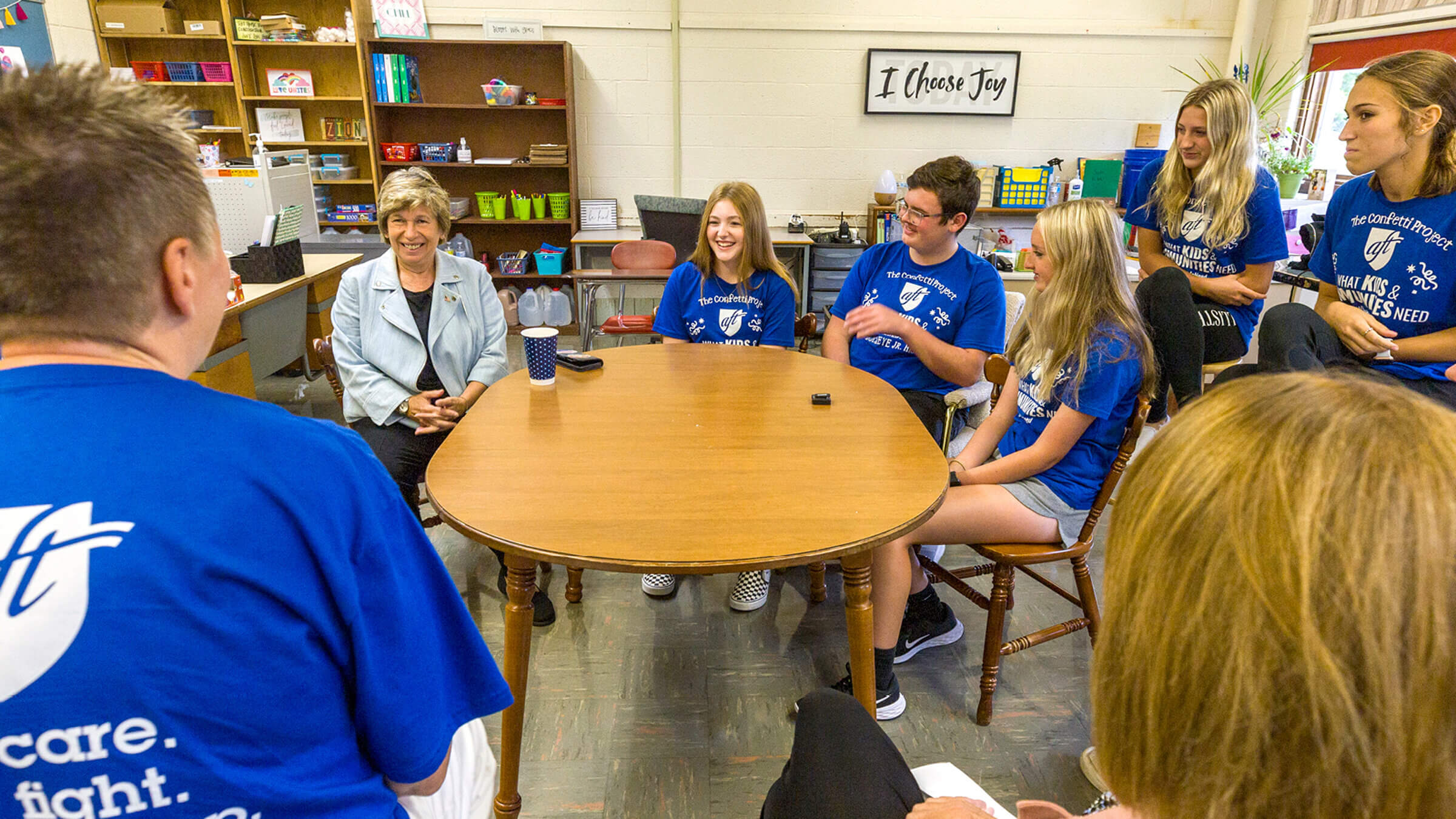Back to school
Educators know what to do right now: Focus like a laser on helping our kids recover and thrive.

Weingarten speaks with participants in the Confetti Project at Buckeye Junior High School in Medina, Ohio, Sept. 13. Photo by Pamela Wolfe
I have been crisscrossing the country lately, as students and staff start the new school year. For the first time since March 2020, school feels familiar. There are challenges, of course, including staff shortages and worries about gun violence. But scientific advances and funding from the federal government have given us the tools to address COVID-19. Educators didn’t need to see declines in test scores to know what to do right now: Focus like a laser on helping our kids recover and thrive. Teach them core skills and knowledge, and to think critically. Teachers will need all the support we can give them.
I was in Medina, Ohio, recently to check out the Confetti Project. (The name is inspired by the saying “Spread kindness like confetti.”) Eighth-grade teacher Jody Keith started the project in 2021 to help students deal with the strains of the pandemic and the angst of adolescence. Students select books that inspire them on topics such as leadership, grief and overcoming anxiety, and then they are paired with a teacher or another adult mentor from the school district who has read the same book. While, as one student told me, “books are the starting point,” a teacher I spoke with emphasized that “the conversations with students are the selling point.” The program aims to build relationships—students with adults, students with students, and schools with communities—and it should spread like confetti.
A few days earlier, I was with students and faculty at Milwaukee Area Technical College. They welcomed President Joe Biden’s student debt cancellation announcement. But they know that students often must choose between staying in college and paying for their basic needs. MATC faculty have set up the FAST Fund for students experiencing economic emergencies. FAST (which stands for Faculty and Students Together) provides rapid financial support to help students with food, rent, child care and other necessities so they can remain enrolled. This year alone, MATC’s FAST Fund has assisted 765 students with nearly $220,000 in direct aid, helping 157 students avoid eviction, providing 184 students with tuition or debt payments, and assisting 157 students with book costs or exam fees. An AFT grant will support establishing FAST funds on at least nine higher education campuses in the Midwest.
Closer to home, I visited PS 48 Michael J. Buczek Elementary School in Washington Heights, N.Y. In one classroom, first-grade students were engrossed in a lesson about germs. “Soap makes germs VANISH,” a very excited student told me. In a third-grade art class, students created collages, inspired by Matisse paintings on the smartboard and soothed by the soft music their teacher plays to create a peaceful atmosphere. The joy of learning was evident throughout this school, which is named in honor of a police officer killed in the line of duty.
This is the unheralded work that happens in public schools every day, in every community across America. But, too often, ideologues’ scaremongering and sensational headlines divert attention from educators’ dedication and from what is needed to support high-quality teaching and learning for all children.
As extremists are trying to ban books, the AFT is well on our way to giving away 1 million books this year—and we will give another million books to kids and families next year. From Scranton to Socorro, from Nashua to Neshaminy, children are delighting in picking out books of their own. As critics complain about student debt forgiveness, the AFT is working to make higher education accessible without a “debt sentence,” by offering student debt clinics, suing fraudulent loan servicers, and promoting public service loan forgiveness so people can choose professions like teaching without being forever buried in debt. And as extremist politicians like Florida Gov. Ron DeSantis make baseless, politically motivated claims that there is “woke indoctrination in our schools” around race and sexuality, educators are doing everything they can to create safe and welcoming environments for students and to help them recover and thrive—academically, socially and emotionally. The AFT’s What Kids and Communities Need campaign is grounded in a simple premise: Teachers want what students need. Those needs are great due to the systemic inequities that have always existed in our schools and society, the trauma and disruption caused by the COVID-19 pandemic, the strain of teacher and school staff shortages, and the cynical attacks on educators and schools by extremists.
The message from parents is equally clear: They don’t want culture wars infiltrating our schools. They support honest, age-appropriate teaching of history. Polling shows that parents like their public schools and appreciate educators’ herculean efforts to support students during the pandemic.
This is the time to bring joy and support into our schools, not politics and hate. This is the time to support America’s largest civic institution—our public schools—to bring our divided country together and nurture our children’s and our nation’s healing. Educators and families are leading the way.












